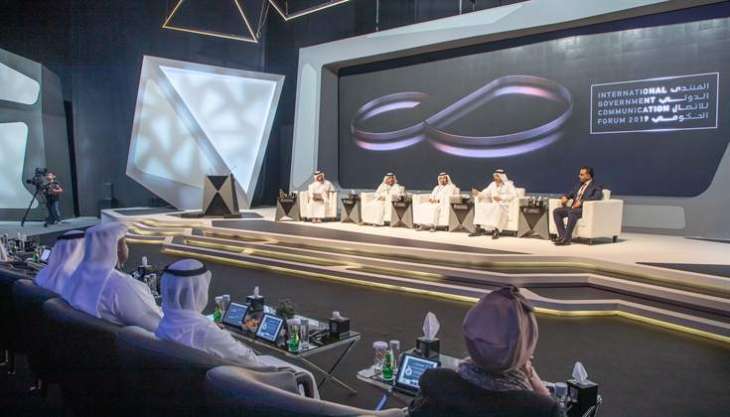One of International Government Communication Forum (IGCF 2019)’s main panel sessions, The ‘Skills of the Future’ Culture: Addressing the Expected Disappearance of Jobs, saw local and regional education experts discussing the ‘skills of future’ culture, as well as expected job cuts
SHARJAH, (Pakistan Point News - 22nd Mar, 2019) One of International Government Communication Forum (IGCF 2019)’s main panel sessions, The ‘Skills of the Future’ Culture: Addressing the Expected Disappearance of Jobs, saw local and regional education experts discussing the ‘skills of future’ culture, as well as expected job cuts.
Emirati experts, Hussain Al Mahmoudi, CEO of the American University of Sharjah Enterprises (AUSE) and Sharjah Research, Technology and Innovation Park (SRTIP); Dr Ali Al Marri, Executive President of the Mohammed Bin Rashid school of Government; Dr Abdullatif Al Shamsi, Vice Chancellor of the UAE Higher Colleges of Technology; and Jordanian guest Dr Adiy Tweissi, Assistant Professor and Director of the E-Learning Centre at the Princess Sumaya University for Technology, discussed the role of technology in shaping future skills.
Dr Al Shamsi began by saying that it is important for educational institutions to keep up to date with the challenges of both future job creation and transforming technology. "Technology is already intervening with job skills, so our role is to help prepare the youth for jobs that we don’t even know exist yet.
"At the Higher Colleges of Technology, we offer training programmes that give students graduate degrees and vocational degrees because we see the importance of a hybrid education. We believe that jobs won’t change in the future; they’ll disappear. Are we ready for that? Fortunately, our leadership boasts vast future foresight, with Dubai, for example, setting up free economic and creative zones in universities, allowing students to carry out business and creative activities and make these part of the education and graduation system. This essentially turns universities into free zones, creating jobs for new graduates, and not waiting for jobs to be created."
Dr Al Shamshi added that this type of visionary leadership, which addressed the gap between students having an idea and turning it into a product or service, is also likely to encourage entrepreneurship. "Students today love risk, are adventurous, enjoy innovation, and have a lot to offer. Education systems must embrace Fourth Industrial Revolution technologies."
Dr Al Mahmoudi acknowledged this, adding that: "Sharjah is also a pioneer in education, with its leadership also understanding that we need to look to the future," he said. "That is why we built the American University of Sharjah, and transformed it into a comprehensive research university. The Emirate also established the Sharjah Research, Technology and Innovation Park (SRTIP), a free trade zone owned by the university, which showcases a progressive way of thinking. We must encourage more partnerships between public and private sectors to maintain innovation."
Dr Tweissi suggested that students’ future career skillsets might change, incorporating more than their official qualifications. "In the future, a lawyer might leave the court to go into a studio to film a documentary, or a surgeon might finish an operation and then code something. The future will be interdisciplinary and education needs to reflect that and adopt a new teaching style. The future’s key skills go further than reading and writing. I am positive that robot coding, for one, will be an essential skill in the future, for example."
Dr Al Marri agreed, adding that: "So many fields will be affected by the Fourth Industrial Revolution, with jobs feeling the impact". He suggested that a key driver to ensure people could adapt was behavioural change. "Individuals need to meet these challenges and adopt education as a lifestyle. Today, many people view education as a phase. They study, they complete their higher education, and then they hope to get a job. This approach is wrong. Education now needs to be lifelong. YouTube, social media platforms and other online offerings give people a way to keep learning. If we don’t continually update our skills, we might be out of a job in the future."
Dr Al Shamsi agreed, saying that any job "based on repetition and routine is likely to disappear, with around 65,000 public-sector jobs needing to be transitioned". With this in mind, he added that it was important for Emirati parents to change their attitudes about children taking on only public-sector roles in the UAE. "We programme our kids to seek public-sector jobs because it’s easier. They get the job, and then they work until they retire. We have to change this thought pattern and encourage a move into the private sector. It’s important that the youth also embrace entrepreneurship and creativity."
Placating people’s fears about machines taking over entirely, Dr Al Mahmoudi added that: "If we don’t have emotion or emotional intelligence, what is the point of technology? Our government is aware of this, and their vision is clear in guiding us in the right direction." Despite technological advances and the need for people to adapt their future skills for jobs that don’t even exist yet, he assured the audience that "human beings are still the key component in all of this".
The eighth edition of IGCF was held under the theme ‘Behavioual Change Towards Human Development’ and organised by the International Government Communication Centre (IGCC), an SGMB subsidiary. It concluded on Thursday.




